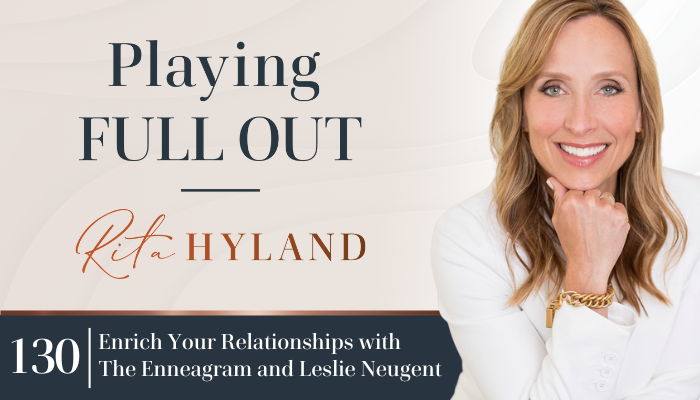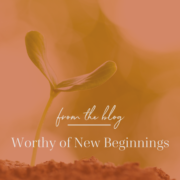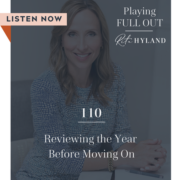Enrich Your Relationships with The Enneagram and Leslie Neugent

Listen to the full podcast episode to learn about the science-backed practice that has not only changed my life but also the lives of countless people over the last two decades. This is something you can’t ignore if you want to achieve that great goal you identified for this year and write your new future.
Today, we’re talking about improving and optimizing your relationships through the profound and popular Enneagram assessment.
Maybe you’ve never done self-growth work before, or maybe you’re someone like me who has spent decades doing the work—either way, I’m confident this episode will provide you with a new insight or way to improve an important relationship –either with yourself or another.
The best part of this episode is who I have with me. She’s the sought-after relationship consultant, Enneagram expert, speaker—and my friend—Leslie Neugent.
Meet Leslie Neugent of Relationship Matters
Leslie has had leadership roles in business, academics and in ministry. After earning her undergraduate and Master’s degrees from Northwestern University, Leslie began her career in advertising. Though she successfully rose through the ranks to become a Vice President, she decided that the advertising world wasn’t a good match for her spirit. She then went on to work for Texas Christian University in Fort Worth where she served as the Director of Admissions for the MBA Program. After taking some time off for motherhood, she entered seminary training where she got her Master’s in Divinity Degree and became a Minister.
How did Leslie get started with the Enneagram?
Leslie was introduced to the Enneagram as part of her seminary training. She found it to be such an incredible tool for her own personal growth that she went on to be mentored by the internationally renowned Enneagram master, teacher, and author, Russ Hudson.
Leslie became certified as an Enneagram teacher and consultant through the Enneagram Institute in New York, and then in 2020, launched her own relationship consulting business called Relationship Matters.
“I had an experience with the Enneagram in seminary where I realized to be a minister, I had to work on some of my blind spots that came with my Enneagram.”
The Enneagram was remarkably transformative for her and sparked her interest in the tool. But then she decided to move it into business through her ministry and pastoral counseling and care.
“I came to realize that there are some very, very specific and nuanced themes that people struggle with and deal with in relationships. Once they become aware of them and realize that there are places they’re stuck and where they have superpowers they’re overusing which can crash into other people that they love’s nervous systems—that is where the money line is.”
Who does Leslie work with?
Today, Leslie works with individuals, couples, families, businesses and groups to help develop the self-awareness that’s necessary for us to heal, grow and optimize our relationships. She’s a speaker, consultant and workshop leader.
My family and I have had the privilege of working with Leslie on the Enneagram. So it is no surprise that I am delighted to have her here!
What is the Enneagram?
The Enneagram is a psycho-spiritual tool that helps us recognize what tells us a lot of things about ourselves, primarily where we’re stuck.
There are nine types within the Enneagram. It identifies what your superpower or gift is that you’ve developed as your way of showing up. The ego needs a way to show up and feel valued and the Enneagram organizes that information into 9 buckets.
Think about B.F. Skinner and his work around positive reinforcement. As children, we need these gifts as our survival mechanism. This is a beautiful thing because we start learning where we fit in the world, and how we can move forward, strive, thrive, and survive. We lean into that and we get good at it.
How does the Enneagram work and why does it matter to leadership and relationships?
In these nine types, there are nine different coping mechanisms or different ways of showing up and feeling valued. They are all necessary and good.
What happens as we get older and our ego takes the wheel is that we fall asleep to all other possibilities of how we can show up, which is very limiting and in some cases can be damaging.
And this is how our unique motivation is formed.
We show up into a family system that’s in action. The movie is already happening. The family system may be healthy, may not be, but your little baby self shows up.
We start trying different things. We get assertive, stomp our feet, and yell. Because, again, this is pre-language and all we have to express ourselves are our actions.
You might get language back to you about being quiet, what the right thing to do is, or how you “should” behave. Perhaps you get non-verbal cues about what you should or should not be doing. Whatever the response is, our nervous systems are receiving this information and learning what to do to protect ourselves.
And from there, we learn what the reward system is which helps us develop our coping mechanism. The problem is, we don’t grow out of that or intuitively learn how to balance our gifts once we hit adulthood. That’s where the Enneagram comes in.
The Enneagram groups these coping mechanisms together in 9 different groups, which are categorized as Types. Each group has its own network of motivations and behaviors.
When we talk about our number (or our Type), think of it as your home base. It’s your superpower or gift, but it can also be your Achilles heel.
This is where we grow from. One of the dangers in Enneagram work (when it’s done too superficially) is it becomes our badge. We can begin to “blame” things on our Enneagram type instead of using it as a tool to inspire personal and professional growth.
First we get aware—80% of things can be changed simply with the awareness of them. And then the Enneagram gives you a roadmap for what to do with that awareness.
Brief introduction to the motivations of the 9 Enneagram personality types
What I love about the Enneagram is the whole idea that every single one of the nine types is a superpower—all of them are good.
The Enneagram is so rich because it’s so positive. It is such a simple system, and yet you can get very deep with it as well.
There are essentially 3 tiers to the system: liberated, evolved, and restricted. When we’re at our most liberated or our most evolved, that’s when we are using our superpower to its five-star level. When we’re overusing our gift (think of it almost like an Achilles heel), that’s when we are relying on it too heavily, and we have to be aware.
There is, in fact, so much to the Enneagram that we’ve decided to split it into two parts. What follows are the Enneagram basics for Type 8, 9, 1, and 2.
Type 8
(Leslie and my husband are Type 8’s.)
Type 8’s superpower or gift
The Challenger or The Protector. They have big energy. (Often one that seems to say, “don’t mess with me!”)
8’s often grow up in a family system where they don’t feel safe. They perceive that no one has their back.
How are Type 8’s motivated?
Because they feel that no one is there to watch out for them, they challenge, they defend, they protect.
8’s are gut-motivated or instinctual, and are in the Anger Triad. Their anger is defensive in nature. It goes up and out of them.
Type 8’s should be aware of
An 8’s energy can be intimidating and almost suck the air out of the room. 8’s need to temper their voice. The answer isn’t to shut down completely—it’s to find the balance and wisely wield the skill of being the protector and the challenger.
Type 9
(Leslie’s husband is a Type 9)
Type 9’s superpower or gift
The Peacemaker or The Mediator. 9’s want to hold all the various viewpoints and not judge them.
How are Type 9’s motivated?
As children, 9’s perceive their voice as not valued. They shrink and quiet themselves.
9’s are gut-motivated or instinctual, and are in the Anger Triad. But they push their anger to the side until they can’t any longer. And then it comes out passive aggressively.
Type 9’s should be aware of
9’s often feel like they can’t say “no” and they dislike conflict even though it’s actually a healthy and necessary part of relationships. The work here is in finding and using your voice.
Type 1
Type 1’s superpower or gift
The Reformer. 1’s can walk into a room and see exactly what’s wrong. They also have a pretty good sense of how to fix it (thanks to being instinctual).
How are Type 1’s motivated?
They want to do things “right” and will often be the first to answer a question or share their opinion.
1’s are also in the Anger Triad and gut-motivated or instinctual. However, they swallow their anger until they become resentful.
Type 1’s should be aware of
When 1’s overuse their gift, their inner critic becomes very loud (both internally and externally). The challenge for 1’s is to let others speak and share their opinions so they feel heard and seen as well.
Type 2
(One of my daughters is a Type 2)
Type 2’s superpower or gift
The Helper or The Giver. 2’s are always there, they always show up. They have such a beautiful emotional IQ.
How are Type 2’s motivated?
2’s love helping and are often very busy! They can easily emotionally tune into a room.
2’s are in the Shame Triad and feel like they must do something to be loved, to matter, or to have value.
Type 2’s should be aware of
2’s need to stay in their lane. Boundaries are key for 2’s! They tend to share their opinions and thoughts (meaning to be helpful) without checking first that it’s what the other person wants and needs—or even asking if that would be helpful.
Stay tuned for Part 2 and the rest of this conversation!
Next up…
Type 3, 4, 5, 6, and 7
In this episode, you’ll …
- Understand what the enneagram is, how it works and why it matters
- Find out how the Enneagram differs from other personality tools
- Understand why the Enneagram is so popular for increasing self-awareness in family dynamics, team building, executive coaching, and marriages
- Learn the super-power and coping mechanism of each of the nine types PLUS…
- the insights I got about myself (even after years of personal growth) that have helped me improve my relationship with my husband and kids today!
Resources and related episodes:
- Tune in to the previous episode, How to Stay Motivated When You’re Just Not Feeling It
- Listen to episode 124: A Practice to Cultivate Your External Self-Awareness
- If you’d like to be notified of when new podcast episodes are released, you can do so here: Playing Full Out
- Learn more about the Inside Out Method
- Connect with Rita on LinkedIn
Subscribe on Apple Podcasts for more tips, tools, and inspiration to lead the optimal vision of your life, love, and leadership. Remember, a half version of you is not enough. The world needs the fullest version of you at play.
___
About Rita Hyland
With over 20 years of experience as an executive and leadership coach, Rita helps leaders — emerging and established — excel in corporate and entrepreneurial environments.
Rita believes if leaders were more clear about how transformation really works and more intentional about creating what they want, their impact, success, and influence in the world would be unstoppable.
Through her coaching programs, private coaching, and masterminds, Rita shows leaders how to win consistently and create the impact and legacy they desire.
Central to Rita’s work is the understanding that you will never outperform your current programming, no matter how strong your willpower.
When you learn to use Rita’s proprietary Neuroleadership Growth Code, a technology that uses the best of neuroscience and transformational psychology to hit the brain’s buttons for change, YOU become both the solution and the strategy.
Her mission is to end talented, hard-working, and self-aware leaders spending another day stuck in self-doubt or confusion and not contributing their brilliant work and talent the world so desperately needs.









Leave a Reply
Want to join the discussion?Feel free to contribute!